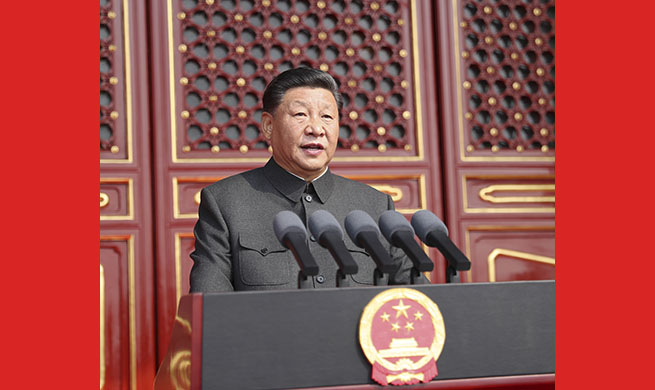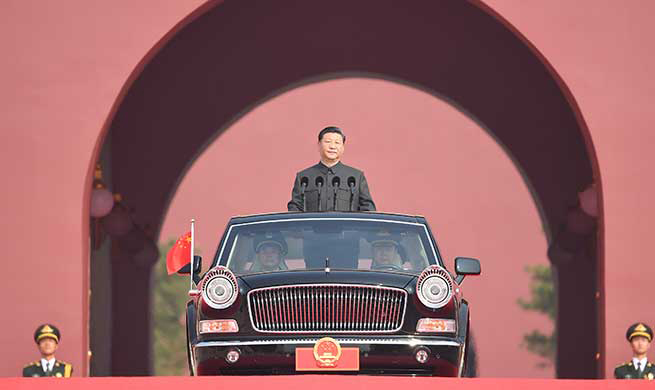KAMPALA, Oct. 7 (Xinhua) -- Over the past five financial years, Uganda has been pushing for rapid transport and energy infrastructure development to fast track its economic development.
The country is now taking a step back and rethinking is infrastructure development push as experts warn that the country's public debt is about to hit the ceiling.
Central bank figures show that although public debt remains at a low refinancing risk, it has risen sharply since financial year 2009/10, with nominal debt to gross domestic product (GDP) ratio increasing from 19.2 percent to 42.2 percent in 2018/19.
Given current commitments on infrastructure projects, Bank of Uganda projects that the public debt will increase further to around 45.7 percent of GDP this financial year 2019/20. According to government this is still below 50 percent of the GDP, a threshold above which a country faces debt distress.
President Yoweri Museveni last month issued a directive that the country should only borrow funds for railway construction, electricity generation, irrigation schemes, strategic roads' building and to some aspects of education and health sectors.
When meeting African Development Bank (ADB) officials, Museveni said the construction of the railway is crucial because it will link Uganda to neighboring countries such as the Democratic Republic of Congo and South Sudan.
He also noted that the current power supply is not enough because the dynamics of the internal economy in Uganda, consumes it all.
Government figures show that as of May 2019, the country's total installed capacity was 1,182.2 MW, having increased from 984.0 MW as at the end of December 2018. Experts argue that availability of cheap electricity will attract investors into the country.
Gabriel Negattu, ADB regional director, said in the Sept. 16 meeting with Museveni that funds borrowed need to be managed for strategic sectors in the economy. He advised government on the need to think broadly beyond Uganda while planning for infrastructure development.
"Think beyond Uganda and go to East Africa in order to create a center for development and economic excellence in the region for the future," said Negattu.
Museveni's stance against borrowing was recently effected when he stopped the borrowing of funds for the construction of the Jinja-Kampala Expressway opting for a public private partnership to build the road.
DEBT FINANCING
Emmanuel Tumusiime Mutebile, governor of the Bank of Uganda, said on Oct. 4 that the bank is facing a challenge of how to accumulate foreign exchange reserves to service external debt.
"The forex reserves have to be purchased from the domestic market, without causing a sharp exchange rate depreciation pressures that would ultimately pass through to domestic inflation, thereby warranting tightening of monetary policy, and subsequently impacting on economic growth," said Mutebile.
He said this financial year 2019/20, the bank has to purchase about 1 billion U.S. dollars to cater for servicing of external debt, debt repayment, and other government imports of goods and services, if the international reserve level has to be maintained at the current level.
The governor projected that the required foreign currency purchases are estimated to rise in the next five years before oil proceeds start flowing in. The country is expected to start commercial production of oil by 2023, although government is locked up in protracted negotiations with the oil companies that have a stake in the wells.
"Buying these amounts without causing sharp exchange rate depreciation pressures in a shallow foreign currency market is a real challenge," said Mutebilesaid.
Central bank figures show that Uganda's external debt has been growing at an annual rate of about 18 percent for the four years up to the 2018/19 financial year.
Whereas there is economic evidence that infrastructure investment is a long term driver of productivity growth, Mutebile argued that it cannot stand alone without also prioritizing other sectors.
The governor said for infrastructure development to result in economic transformation, it must be, among others, combined with a skilled labor force.
Uganda's prosperity in the years ahead, according to Mutebile, will largely depend on its skilled human capital, which is useful for innovating and has a stronger effect on economic growth.
He argued that for human capital development to occur, there is need to change the composition of public spending, noting that there is need for the right mix of public infrastructure investment and social spending.
The governor said although concessional financing has substantially declined, access to international financial markets has eased.
He said the opportunity to borrow from international financial markets has become very tempting especially in anticipation of oil revenues, which serve as collateral.
"In my view, public investments financed by public borrowing against future oil revenue is a precursor for a resource curse," said Mutebile, warning Uganda not to fall into the temptation.
Government has previously said that oil revenues would be used mainly for infrastructure development and investment in science and innovation.












